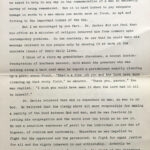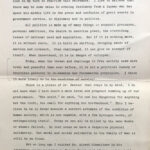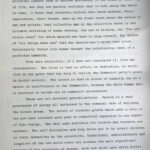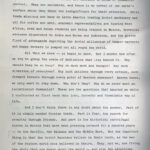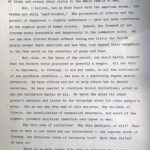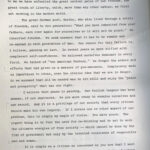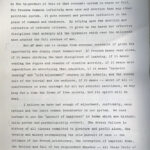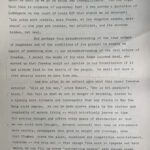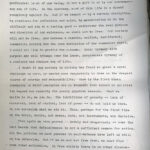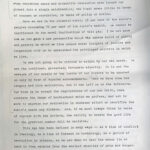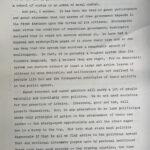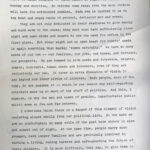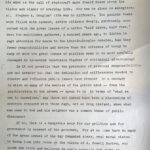Pine Mountain Settlement School
Series 07: DIRECTORS
Burton Rogers: Adlai Stevenson Speech
“The Political Relevance of Moral Principle”
BURTON ROGERS Adlai Stevenson Speech, 1959
TAGS: Burton Rogers, Adlai Stevenson speech, A. Powell Davies Memorial Lecture, Dr. A. Powell Davies, the political relevance of moral principle, challenges to free society, moral and social solidarity, Communists, Soviet life, USSR, complacent self-confidence, nature of freedom, racial equality, dedication and selflessness
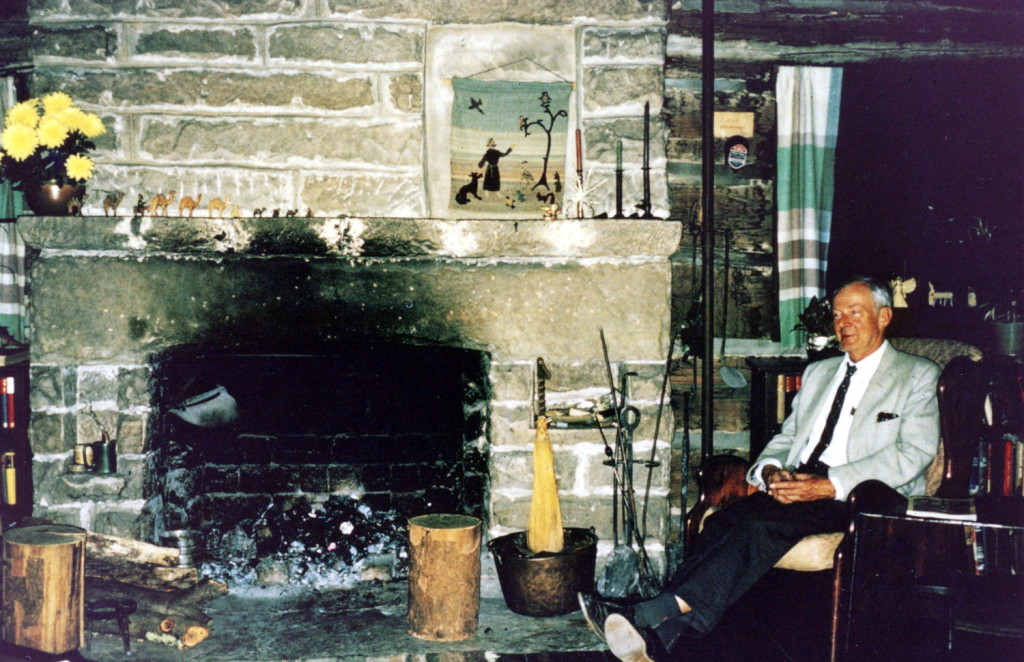
BURTON ROGERS Adlai Stevenson Speech: This page provides images and transcription of the lecture, “The Political Relevance of Moral Principle,” which Adlai E. Stevenson II delivered on January 18, 1959, at Constitution Hall, Washington, DC, inaugurating a series of annual lectures in memory of Dr. A. Powell Davies. This insightful speech is as relevant in today’s world as it was during the Cold War period in which it was presented. (Images of the letters include notations by PMSS’s then-director Burton Rogers, revealing his thoughts on the subject.)
TRANSCRIPTION: BURTON ROGERS Adlai Stevenson Speech
[14 pages]
[IMG_3416], page 1
Adlai E. Stevenson
A. Powell Davies Memorial Lecture
Constitution Hall, Washington, D.C.
Sunday, January 18, 1959
For release: Monday A.M.
Newspapers, January 19, 1959
“THE POLITICAL RELEVANCE OF MORAL PRINCIPLE”
I am profoundly flattered by your invitation to inaugurate these annual lectures in memory of Dr. A. Powell Davies. It is an honor to be asked to help in any way in the commemoration of a man so eminently worthy of being remembered. But it is hard indeed to pay adequate homage in words to a man whose own words were so fresh, so apt and fitting to the important issues of the day.
But I am encouraged by one fact. Dr. Davies did not feel that his office as a minister of religion debarred him from comment upon contemporary problems. On the contrary, he saw that he could make his message relevant to his people only by showing it at work in the concrete issues of their daily lives.
I think of a story my grandfather Stevenson, a devout Scotch-Presbyterian of Southern descent, told about the preacher who was driving along a back road when he espied a parishioner wearily clearing up a poor, stony field. “That’s a fine job you and the Lord have done cleaning up that rocky field,” he shouted. “Thank you, parson,” the man replied. “I wish you could have seen it when the Lord had it all to himself.”
Dr. Davies believed that God is dependent on man, as man is on God. He believed that the clergy above all were responsible for making a reality of the bond between God and man, and he was fearless in letting his congregation and the world know the truth as he saw it. He had a sensitive awareness of peril to the individual in our day of bigness, of statism and conformity. Therefore he was impelled to fight for the oppressed and the persecuted; to fight for equal justice for all and the rights inherent in our citizenship. Ardently he defended freedom of the mind, free speech, the right of the dissenter to speak and the duty of the conformist to listen. And his compassion was boundless.
It was the tardiness of the American social conscience in understanding the severity of its ordeal with authoritarianism that made Dr. Davies impatient, that made him work so hard to awaken us to the perils. He literally wore himself out trying to mobilize public
[IMG_3417], page 2
opinion and induce every American to hold himself personally responsible for the preservation of freedom.
From the mountain of vision, Dr. Davies constantly proclaimed the political relevance of moral principle and of religion as a “judgment of righteousness.” From the dusty plain of politics I would like in my turn to reaffirm this relevance. I like to believe that there may be some value in echoing testimony from a layman who has spent his middle life in the press and confusion of great events in government service, in diplomacy and in politics.
All politics is made up of many things — economic pressures, personal ambitions, the desire to exercise power, the overriding issues of national need and aspiration. But if it is nothing more, it is without roots. It is built on shifting, changing sands of emotion and interest. When challenged, it can give no account of itself. When threatened, it is in danger of collapse.
Today, when the threat and challenge to free society seem more total and powerful than ever before, it is not a political luxury or fruitless pedantry to re-examine our fundamental principles. I think it more likely to be the condition of survival.
There is a phrase of Dr. Davies’ that stays in my mind. I do not know when I have heard a more terse and pregnant summing up of our predicament. “The world,” he said, “is now too dangerous for anything but the truth, too small for anything but brotherhood.” This I believe to be in broad measure a correct estimate of the condition of human society, which is now capable, with a few hydrogen bombs, of extinguishing itself. Today we can all be killed by the same bombs or atomic fallout. In that sense we have a desperate physical solidarity. But moral and social solidarity in the family of man is still to be found.
Not so long ago I visited Dr. Albert Schweitzer in his primitive jungle hospital in French Equatorial Africa, and he told me he considered this the most dangerous period in history, not just modern history, but all human history. Why? Because, he said, heretofore nature has controlled man, but now man has learned to control elemental forces — before he has learned to control himself.
Many of us seem to rely on some mythical God-given superiority of the white Western world to save us. And my concern is that there
[IMG_3418] NO IMAGE
[IMG_3419], page 3
is more evidence that the Communists accept the reality of the human condition than we do.
It is impossible to spend weeks travelling around the Soviet Union as I did this summer without taking away an overwhelming impression of thrust and purpose in most aspects of Soviet life. The revolutionary ardor has cooled with time but even the very pragmatic political leaders seem to believe profoundly in the truth of their way of life, and they are quietly confident that it will sweep the world in time. I think they sincerely believe that their methods, their aspirations, their dreams, make up the final truth about the nature of man and society; that collective man in the collective state is the ultimate unfolding of human destiny, the end of history, the “far off divine event” for which mankind has been in long travail, the vision of “all things made new” that has haunted men’s minds ever since Christianity thrust into human thought the intoxicating ideal of a perfected humanity.
From this conviction, if I have not overstated it, flow two consequences. The first is that no effort, no dedication, no sacrifice is too great that may help to realize the Communist party’s goals in Soviet society. The second is that no corner of humanity can be a matter of indifference to the Communists, because the whole human race is destined to become one in communist brotherhood.
These are not abstract generalizations. Russia is a vast powerhouse of energy all harnessed to the communal task of building the Soviet dream. The thrust of economic growth which adds a nine or ten per cent increase each year to industrial expansion is one aspect of this energy. The vast sums available for science and research are another. The self discipline and long hours put in by school children to train themselves as the scientists, technicians, administrators and linguists of the new world order are perhaps the most significant measure of the resources of energy, work and skill upon which Soviet leaders hope to draw. In Moscow, Serge Obraztsov, the brilliant director of the famous Puppet Theatre, said: “I visited China five years ago. It was the most extraordinary experience of my life. People in China have had nothing — nothing! Now several hundred million people are dreaming of tomorrow. I cannot describe to you the feeling of excitement there — much, much more even than here in the
[IMG_3420], page 4
Soviet Union.”
The energy, the drive, the dedication in the USSR spill over into international affairs. In part, of course, this is the restless concern which all imperial powers must exercise, especially when the peoples they control are as restive and unreliable as the captive peoples in Russia’s European empire. But communist activity, planning and efforts in trade and aid are not confined to areas of communist control. They are worldwide, and there is no corner of the earth’s surface which they think too insignificant for their attention. While trade missions are busy in Latin America trading Soviet machinery and oil for coffee and wool, academic representatives are touring West Africa, Arab and Asian students are being trained in Moscow, technical advisers dispatched to India and Burma and Indonesia, and the glossy flood of propaganda depicting the Soviet millennium of bumper harvests and happy workers is pumped out all round the world.
All this we know — or begin to know. But I wonder how often we try to grasp the scale of dedication that lies behind it. Why should they be so busy? Why so much work and thought? Why such diversion of resources? Why such patience through every setback, such forward thrusts through every point of Western weakness? Heaven knows, we only want to stay home. Why don’t they? Why do we never meet an isolationist Communist? These are the questions that haunted me while I confronted at first hand this iron, forceful and formidable way of life.
And I don’t think there is any doubt about the answer. Part of it is simply needed foreign trade. Part is fear, the search for security through friends. And part is the historical centrifugal forces in Russia that have been pressing outward for a hundred years — to the Pacific, the Balkans and the Middle East. But the important thing is that the Soviet Russians believe in their truth, as the men of the Western world once believed in theirs. They, not we, are firing the shots that are heard round the world — and also the satellites that orbit above it. The fact that their faith is in many ways an evil perversion of the great propositions that once made the blood course in our Western veins does not alter the fact that their tempo is dynamic and ours sluggish — even, I think, to ourselves.
The reason cannot be that we Americans have lost our vision of
[IMG_3421], page 5
truth and brotherhood. No country on earth owes the sense of community more explicitly to the fact that it is united not by race or nationality but by fidelity to an idea. We were born “dedicated to a proposition” and our greatest leaders — the Jeffersons, the Lincolns, the Woodrow Wilsons — were not great because they achieved purely American purposes, but because they were able to speak for humanity at large and extend their vision to the whole family of man.
Nor, I believe, can we find fault with the American dream. Its truths are still “self-evident.” The possession of liberty and the pursuit of happiness — rightly understood — have not been overthrown as the highest goods of human society. Indeed, the ferment of our freedom works inexorably and dangerously in the communist world. No one can have visited Poland without seeing how little the Polish people accept their servitude and how they look beyond their neighbors to the free world as the reservoir of power and hope.
But, alas, on the basis of the record, one would hardly suspect that the Western world possessed so powerful a weapon. All our talk — in diplomacy, in strategy, in aid and trade, in all the intricacies of our worldwide relations — has been to a depressing degree purely defensive. We have offered aid not to help others but to shield ourselves. We have reacted to countless Soviet initiatives; acted on our own initiative barely at all. We watch the skies for other people’s sputniks and listen to the telegraph wires for other people’s moves. Yet we are the free men of this universe, the children of liberty, the beneficiaries of unequalled abundance, and heirs of the highest, proudest political tradition ever known to man!
Why this lack of initiative? Why this paralysis of will? What have we done to our truth and our brotherhood — the supreme truth of freedom, the Christian truth of brotherly love? Have they failed? Or have we?
There is no more urgent duty than to discover why we have failed and to get back into the arena, aspiring, striving, fighting once more for what we believe. An examination of what you might call our collective conscience is to my mind far more important than particular projects or programs. You can have a perfect assembly of pieces for your watch, but they are worthless if the mainspring is broken. I am not basically worried about our various pieces — our
[IMG_3422], page 6
technology, our science, our machines, our resources. But I am concerned, desperately concerned, about our mainspring. That it has run down, we know. But is it broken beyond repair? In the last analysis, no question is worth more consideration in America today.
And I would like to suggest some of the ways in which it seems to me we have enfeebled the great central pulse of our freedom, the great truth of liberty, which, more than any other nation, we first set working in the modern world.
The great German poet, Goethe, who also lived through a crisis of freedom, said to his generation: “What you have inherited from your fathers, earn over again for yourselves or it will not be yours.” We inherited freedom. We seem unaware that it has to be remade and re-earned in each generation of man. One reason for this failure is, I believe, passing at last. In recent years we were stifled with complacent self-confidence. We believed ourselves dominant in every field. We talked of “the American Century.” We forgot the ardors and efforts that had given us a measure of pre-eminence. Complacency made us impervious to ideas, even the obvious idea that we are in danger. So we assumed that all we needed was to sit still and enjoy the “peace and prosperity” that was our right.
I believe that phase is passing. Our foolish languor has been shaken, if not shattered. We are more ready to examine ourselves and our record. And it is a privilege of our society that every citizen should make his own inquiry. If I stress one or other aspect of our problem, this is simply my angle of vision. You have yours. The urgent thing is to feel the need for re-thinking and to set to work the ultimate energies of free society — which cannot be done by the fiat of government but only by the troubled conscience of responsible men and women.
It is simply as a citizen as concerned as you are that I want to suggest what seems to me to be the obstacles to a full understanding of our great mission in this time of testing.
I believe — as I have said before — that we have confused the free with the free and easy. If freedom had been the happy, simple, relaxed state of ordinary humanity, man would have everywhere been free — whereas through most of time and space he has been in chains. Do not let us make any mistake about this. The natural government of
[IMG_3423], page 7
man is servitude. Tyranny is the normal pattern of government. It is only by intense thought, by great effort, by burning idealism and unlimited sacrifice that freedom has prevailed as a system of government. And the efforts which were first necessary to create it are fully as necessary to sustain it in our own day.
He who offers this thing we call freedom as the soft option is a deceiver or himself deceived. He who sells it cheap or offers it as the by-product of this or that economic system is knave or fool. For freedom demands infinitely more care and devotion than any other political system. It puts consent and personal initiative in the place of command and obedience. By relying upon the devotion and initiative of ordinary citizens, it gives up the harsh but effective disciplines that underpin all the tyrannies which over the millennia have stunted the full stature of men.
But of what use is escape from external restraint if given the opportunity men simply stunt themselves? If freedom means ease alone, if it means shirking the hard disciplines of learning, if it means evading the rigors and rewards of creative activity, if it means more expenditure on advertising than education, if it means “bachelor cooking” and “life adjustment” courses in the schools, and the steady cult of the trivial and the mediocre, if it means — worst of all — indifference or even contempt for all but athletic excellence, we may keep for a time the forms of free society, but its spirit will be dead.
I believe we have had enough of adjustment, conformity, easy options and the least common denominator in our system. We need instead to see the “pursuit of happiness” in terms which are historically proven and psychologically correct. The dreary failure in history of all classes committed to pleasure and profit alone, the vacuity and misery accompanying the sole pursuit of ease — the collapse of the French aristocracy, the corruption of imperial Rome, the decline and fall of the resplendent Manchus — all these facts of history do not lose their point because the pleasures of today are mass pleasures and no longer the enjoyments of an elite. If we become a nation of Bourbons, numbers won’t save us. We shall go their way. Vacuity and indifference are not redeemed by the fact that everyone can share in them. They merely restrict the circle from which regeneration can come.
I say this in no Puritan or pleasure-hating spirit. On the
[IMG_3424], page 8 (sic)
contrary, there is no boredom or misery to equal the pursuit of distraction alone. We do not slip into happiness. It is strenuously sought and earned. A nation glued to the television screen is not simply at a loss before the iron pioneers of the new collective society. It isn’t even having a good time. No society has ever spent as much as we do on drink and tranquillizers. Can one argue that this is evidence of universal fun? I ran across a quotation of LaBruyere on the court of Louis XIV that struck me as relevant: “Les joies sont visible, mais fausse, et les chagrins cachés, mais reels” — its joys are visible, but artificial, and its sorrows hidden, but real.
But perhaps this misunderstanding of the true nature of happiness and of the conditions of its pursuit is simply an aspect of something else — our misunderstanding of the real nature of freedom. I recall the words of the wise Judge Learned Hand, who warned us that freedom would not survive in our Constitution if it had already died in the hearts of the people. We shall not have a free society unless we have free men.
And how often do we reflect upon what this inner freedom entails? “Give me the man,” cries Hamlet, “who is not passion’s slave.” But this is what we are in danger of becoming, slaves to a tyranny more intimate and inescapable than any Stalin or Mao Tse Tung could impose. We can be made slaves simply by the clutter and complexity of modern living — which notoriously leaves no time for serious thought and offers every means of distraction so that we can avoid such thought. Between aircraft that take us everywhere more rapidly, newspapers that grow in weight and coverage, news that flashes round the globe, ceaseless and competitive entertainment, fashions — God help us! — that change from sack to trapeze and back again, we can fill up every “unforgiving minute” with enough trash and preoccupation to still forever the deeper voices of the soul. Like Matthew Arnold, we can
… see all sights from pole to pole,
And glance and nod and bustle by,
And never once possess our soul
Before we die.”
[IMG_3425] NO IMAGE
[IMG_3426], page 9
How are we to defend freedom if, for the tyranny of external control we substitute the clattering, cluttering tyranny of internal aimlessness and fuss? This freedom for our souls, freedom at the profoundest level of our being, is not a gift to us by our contemporary way of life. On the contrary, much of this life is a direct conspiracy against it. And if we cannot — by a certain discipline, by readiness for reflection and quiet, by determination to do the difficult and aim at a lasting good — rediscover the real purpose and direction of our existence, we shall not be free. Our society will not be free. And between a chaotic, selfish, indifferent, commercial society and the iron discipline of the communist world, I would not like to predict the outcome. Outer tyranny with purpose may well triumph over the inner, purposeless tyranny of a confused and aimless way of life.
I doubt if any society in history has faced so great a moral challenge as ours, or needed more desperately to draw on the deepest course of courage and responsibility. Ours is the first human community in which resources are so abundant that almost no policies lie beyond our capacity for purely physical reasons. What we decide to do, we can do. The inhibitions of poverty — lack of resources, lack of capital, lack of power — do not hold us back. We can [accomplish] what we aim at. Thus, perhaps for the first time in the world, choice, not means, ends, not instruments, are decisive.
Then again we have proved — drably and dangerously — over the last decade that defensiveness is not a sufficient reason for action. All the policies we have pursued in self-defense have left us still on the defensive. But if we do not act from fear, we must find some other motivation. In free society there is no other alternative but to tap the vigor, faith and imagination of the people themselves. We must find out once more who we are, as the psychologists say. And I would earnestly appeal especially to the women of America to organize an “Operation Wisdom” and to lead the way to a new self-examination and self-discipline.
[IMG_3427], page 10
But perhaps the most urgent reason why the quality of our moral response has become the decisive issue in politics is quite simply that most of the major problems of our day present themselves in moral terms and are probably insoluble without some stirring of generosity, some measure of vision. Let me give you three instances. In the wealthiest nation in the world, at least 5 million families still live in squalid but remediable poverty. They are a minority. They don’t have the votes to force the issue of their misfortune into the front rank of public issues. They depend, for remedies, upon the alert conscience of the majority. But how do we keep the conscience sensitive and alert? By concentrating on our own concerns and adding the dishwasher to the television set to the air conditioner? By griping over taxes and attacking that great bogey we call “the welfare state?” By closing our minds every time our shiny car takes us through a slum? NO — we shall have the dedication and drive to wipe poverty out of this rich land only if the well-to-do majority of today do not repeat the selfish indifference which, in many communities, has been the epitaph of yesterday’s wealthy elite.
Or take the issue of the rights and status of our colored citizens. This is our small share of a world-wide problem. The four hundred years’ dominance of men of white skin is ending.
The vast colored majority of mankind are seeking the opportunity and the respect which white people have been lucky enough to enjoy for so long — sometimes at the colored people’s expense. But, within this world-wide crisis, we in America, with our colored minority, have a major role to play — for good or evil. “The unfinished work” which Lincoln left us, of creating a society in which all men can hold up their heads as equals and self respecting citizens, can never be accomplished unless there are enough white men and women who resist in the core of their being the moral evil of treating any of God’s children as essentially inferior.
Nor is this simply a question of our own national community. I come back to the painful fact that the communists show a worldwide concern which is largely lacking among the men of the West. The whole human race is their horizon. Their “brotherhood” is
[IMG_3428], page 11
materialist, collectivist, atheist, and we dislike it, but it embraces everybody, and it is the framework of policies which take the missionaries of their new order to the ends of the earth. I say with all the emphasis I can command that we have no corresponding commitment to our fellowmen. For hundreds of years, we have preached the Christian promise of brotherhood, but today, when vanishing space and scientific revolution have turned our planet into a single neighborhood, the ideal means little in terms of concern or conviction, in terms of policy or action.
Here we are in the Atlantic world, 16 per cent of the world’s peoples consuming 70 per cent of the world’s wealth. we cannot be indifferent to the moral implications of this gap. I do not know how we can gain a new perspective about the narrow world of plenty and poverty in which we live unless moral insights of justice and compassion stir us to understand the privileged position in which we live.
We are not going to be stirred to action by our own needs. We are the cushioned, protected, fortunate minority. It is not the measure of our morals or the lesson of our history to be spurred on only by fear of Russian encroachments. What we have done has largely had this motivation, and it has left us on the defensive. Our hope is to accept the implications of our own faith, make concrete the image of brotherhood which we profess, and set to work to express our dedication in whatever effort or sacrifice the world’s needs may dictate. And, if we must always think in terms of contest with the Soviets, the ability to create the good life for the greatest number will be decisive.
This age has been defined in many ways — as a time of conflict in ideology, as a time of ferment in technology, as a period of revolution in science, as an era when at last the means lie at hand to free mankind from the ancient shackles of pain and hunger. It is all these things — but I believe the true crisis of our times lies at a deeper level. We have indeed conquered means and resources unknown to earlier ages.We have had thrown open to us frontiers of choice which would leave earlier ages stupefied by their scale and scope.
But all this freedom and elbow room only thrusts onto us with more force the fundamental issue of the faith that is in us. We can use our wealth and capacity for some vision of truth, some ideal of brotherhood, or we can imprison ourselves within the selfishness of our own concerns and the limitations of a narrow nationhood. This is the dimension of our crisis.
[IMG_3429], page 12
You may argue that these qualities — of dedication and selflessness — are pretty remote from the realities of politics. They are all very well for private life, but what part can they play in the rough and tumble of partisanship, of primaries, conventions and election campaigns? Ambition, drive, material interests, political skills, the art of maneuver — all these, you say, have their part, but do not let us pretend that the democratic process is primarily a school of virtue or an arena of moral combat.
And yet, I wonder. It has been the view of great philosophers and great statesmen that our system of free government depends in the first instance upon the virtue of its citizens. Montesquieu made virtue the condition of republican government; Washington declared that it could not survive without it. We have had a hundred and seventy-five years of it since their time and no one can deny that the system has survived a remarkable amount of skullduggery. In fact, it is probably a tougher system than its founders imagined. Yet I believe they are right. For no democratic system can survive without at least a large and active leaven of citizens in whom dedication and selflessness are not confined to private life but are the fundamental principles of their activity in the public sphere.
Naked interest and naked ambition will carry a lot of people naturally and inevitably into politics. We do not need societies for the promotion of lobbies. Interests, good and bad, will promote themselves, Nor, in any generation do we lack politicians whose only principle of action is the advancement of their own career — the starry-eyed opportunists and all the other eager men in a hurry to the top. But into what state must politics degenerate if that is all we find active in the political arena? That and sectional interests played upon by personal ambitions? There have been such periods — the roaring nineties, the time from Harding to the Wall Street crash — but our democratic system survived because such epochs were followed and cleansed by periods of disinterested reform.
But there has never been any disinterested reform without disinterested reformers. And here we come to the essential contribution made by dedication and selflessness to the public good.
[IMG_3430], page 13
No one ever did any good in politics without readiness for endless hard work — for the grinding, boring, tedious work, as well as the glamorous, high sounding, headline hitting work. The painstaking hours collecting the facts, the hours in committee and conference, the hours in persuasion and argument, the hours of defeat and disappointment, the hours of disgust and revulsion at the darker sides of human behavior — these cannot be supported without energy and devotion. No reforms come easy; even the most obvious will have its entrenched enemies. Each one is carried to us on the bent and weary backs of patient, dedicated men and women.
They are not only dedicated in their readiness to give energy and hard work to the cause; they must also have sufficiently clear sight and open minds and hearts to see the need for reform in the first place. But clear sight and an open heart for others’ needs is again something that hardly “comes naturally.” We have so many needs of our own — our families, our jobs, our homes, and fortunes, our prospects. We are hemmed in with needs and interests, weighty, urgent, honorable, human needs and interests, even if they are exclusively our own. It takes an extra dimension of vision to see beyond our inner circle of interest. Most people, most of the time, do not possess it — which is one reason why self-regarding interests make up so much of the stuff of politics. And this, I suppose, is why the men and women of genuine, imperturbable public spirit seem so few and far between.
I sometimes think there is a danger of this element of vision vanishing almost wholly from our political life. In the main we are so comfortable; so many evils of the past have shrunk in size and almost out of sight. At the same time, people marry much younger, have larger families and are profoundly involved in earning a living, making careers and safe-guarding the future of their children. It is more difficult, they say, to give time to public affairs when private life is so urgent and absorbing.
Yet is it, I wonder, more urgent and absorbing than a hundred years ago when young men not only married young, had large families and built up careers, but also opened up the new frontiers, created new cities from the wilderness and gave to new states and communities the framework of active political life?
[IMG_3431], page 14
If one reads the life of young Abe Lincoln, it is hard to believe that his struggles as a young lawyer and his difficulties as a young parent were less than those of young men today. Yet there was no time when the deepest issues of the day did not occupy his mind or the call of statecraft make itself heard above the claims and clamor of everyday life. Nor was he alone or exceptional. Stephen A. Douglas’ life was no different. The prairie towns were filled with earnest, active citizens deeply, profoundly concerned with the great issues of a nation “half slave, half free.” When the multitudes gathered, a hundred years ago, to listen in rapt attention for hours to the Lincoln-Douglas debates, had they fewer responsibilities and duties than the citizens of today to many of whom the great issues of politics seem to be most usefully conveyed in 15-second television flashes of subliminal advertising?
Is it not possible that the pressures of personal responsibilities are not greater but that the dedication and selflessness needed to discern and influence public issues have shrunk? In a century in which so many of the mentors of the public mind — from the psychiatrists to the ad-men — speak to us in terms of “what we owe to ourselves,” may there not indeed have been a slackening of devotion compared with those days, not so long distant, when what man owes to God and his neighbor was a common theme of public discourse?
If so, this is a dangerous hour for our politics and for government by consent of the governed. For at no time have so many of the great issues of the day demanded clear, real moral vision to bring them into focus — the vision of A. Powell Davies, who loved the truth and believed in man’s capacity and right to govern himself.
GALLERY: BURTON ROGERS Adlai Stevenson Speech
- 3416 Adlai Stevenson. Speech – “The Political Relevance of Moral Principle,” page 1.
- 3417 Adlai Stevenson. Speech -“The Political Relevance of Moral Principle,” page 2.
- 3419 Adlai Stevenson. Speech -“The Political Relevance of Moral Principle,” page 3.
- 3420 Adlai Stevenson. Speech -“The Political Relevance of Moral Principle,” page 4.
- 3421 Adlai Stevenson. Speech -“The Political Relevance of Moral Principle,” page 5.
- 3422 Adlai Stevenson. Speech -“The Political Relevance of Moral Principle,” page 6.
- 3423 Adlai Stevenson. Speech – “The Political Relevance of Moral Principle,” page 7.
- 3424 Adlai Stevenson. Speech – “The Political Relevance of Moral Principle,” page 8.
- 3426 Adlai Stevenson. Speech – “The Political Relevance of Moral Principle,” page 9.
- 3427 Adlai Stevenson. Speech – “The Political Relevance of Moral Principle,” page 10.
- 3428 Adlai Stevenson. Speech – “The Political Relevance of Moral Principle,” page 11.
- 3429 Adlai Stevenson. Speech – “The Political Relevance of Moral Principle,” page 12.
- 3430 Adlai Stevenson. Speech – “The Political Relevance of Moral Principle,” page 13.
- 3431 Adlai Stevenson. Speech – “The Political Relevance of Moral Principle,” page 14.

